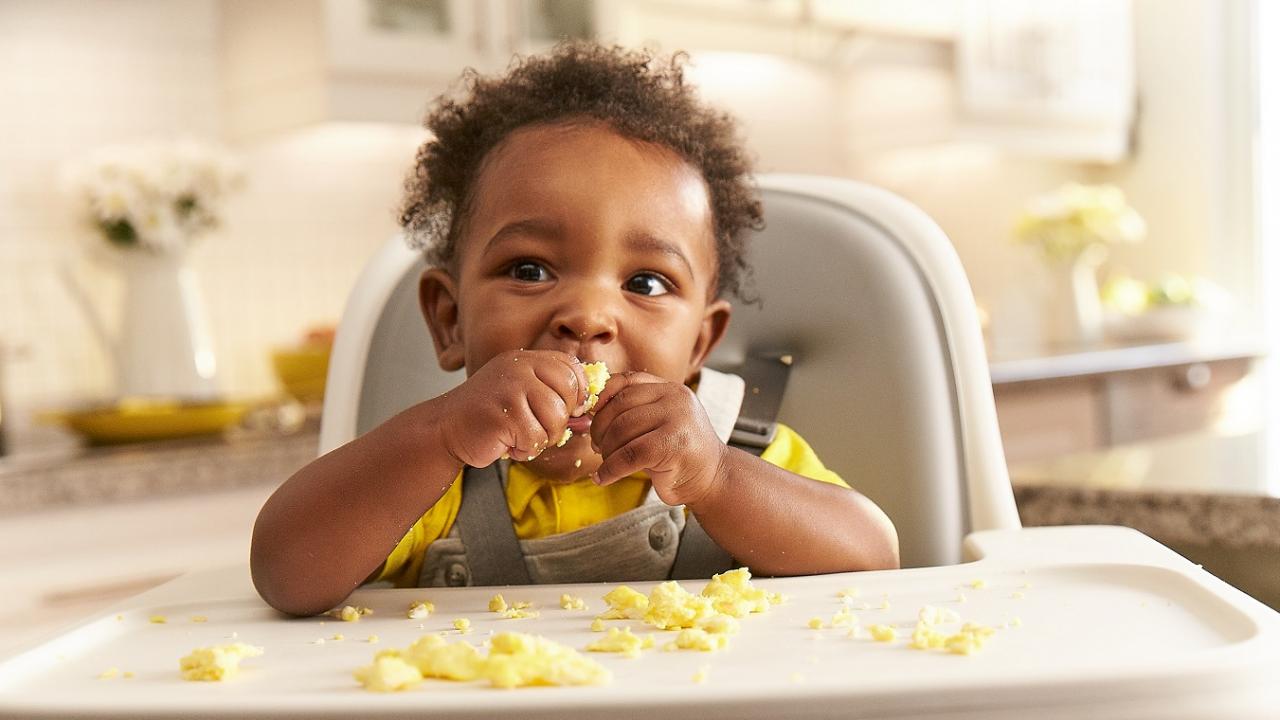For Your Baby

Eggs, A Perfect First Food for Babies
Natural and nourishing, eggs are an ideal choice as one of your baby’s first solid foods. Eggs are easy for your baby to eat, a cinch to keep on hand, and super simple to prepare.
Provide your baby with the full benefits of eggs by offering both the white and yolk. The yolk contains protein, energy, fatty acids, and nutrients such as choline, which is highly important for brain development and health. Eggs are an excellent source of the highest quality protein and contain 13 important nutrients, including:
- protein to build & repair muscle
- choline & lutein for brain development
- vitamin A for vision & bone growth
- vitamin D & phosphorus for strong bones
- vitamin E for a boost to the immune system
- B vitamins for nerve & blood cell health
- folate for blood cell & spinal cord development
- zinc for reproductive organs & brain function
- selenium for DNA production & thyroid function
- iron for red blood cell health
Introduce Eggs Early
Studies have shown that feeding your baby whole eggs early can help prevent an egg allergy. In fact, the newest infant feeding guidelines from Health Canada, the Canadian Paediatric Society, Dietitians of Canada, and the Breastfeeding Committee for Canada recommend whole eggs starting at 6 months of age, or as soon as your child starts eating solid foods.
Eggs & Choline
Choline is a key nutrient for learning, memory, and overall cognitive abilities. For optimal brain development, introduce eggs to your baby at 6 months as recommended by the Canadian infant feeding guidelines. Eggs are loaded with a significant amount of choline, which cannot be found easily in other foods.
A Solid Start to Good Health
It’s easy to introduce cooked eggs to your baby. Just follow these simple steps:
- Hard boil a whole egg and mash it. Always be sure to cook eggs well for baby.
- Mix about 2 tsp (10 mL) of egg with a little breast milk or formula.
- Offer your baby 1 tsp (5 mL) at first. You can offer more if your baby still shows signs of hunger. Trust your baby to know when to stop eating.
Signs baby is ready to eat solid foods:
- Can sit up.
- Has good head control.
- Shows interest & opens mouth when offered food.
Baby Steps

Once you start, gradually add eggs to your baby’s meals. Eggs are super easy to prepare for breakfast, lunch, dinner, or snacks. Help your baby learn to enjoy new tastes and textures:
- At 6 months start by offering smoother puréed blends.
- At 7 months move on to mashed and minced textures.
- Before you know it your baby will be ready for finger food fun!
Munchkin Menus

Simple Scrambled Eggs
With only two ingredients, this recipe could not be easier!
You’ll need:
- 1 large egg
- 2 tbsp (30 mL) breast milk or formula
Prep and cook:
- Mix egg with breast milk or formula and whisk until well combined.
- Heat a non-stick pan over medium heat and add egg mixture. Cook, stirring often with a spatula, until eggs are scrambled and completely cooked through.
- Chop into tiny bits and serve to your baby.
Egg and Pea Mash
Eggs and peas make a great pair, teaming up to give baby protein, iron and fibre!
You’ll need:
- ½ cup (125 mL) fresh or frozen peas
- 1 large egg
Prep and cook:
- Steam or boil peas until very tender. Drain as needed and mash or purée to desired texture. Let cool.
- Hard boil the egg, cool, peel, then mash it very well.
- Add ½ cup (125 mL) pea purée and mash with the egg until you have the right texture for your baby. Add a little breast milk or formula to thin if you like.